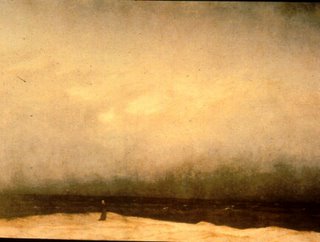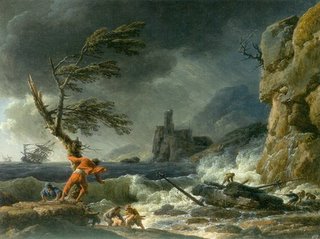 The Deutschland plunges into the North Sea. The overall atmosphere, as at the beginning of Hamlet, is cold and unkindness. And here, we have the name of the ship for the first time in the poem—and it is as striking as it would be in a movie if we first saw the ship’s name in snow & ice & lashing sea, perhaps even lit by a flash and accompanied by thunder & the shrieks of the wind—The Deutschland! Later, in stanza 20, Hopkins will underscore the fitting ironies in the ship’s name—“O Deutschland, double a desperate name!” Of course, little did Hopkins know in 1875 how fitting, how prophetic his poem would be! But for now, for irrational arrogance, the ship is ‘hurling the haven behind.” And it goes into a world that is “unkind” . . .”black-backed” . . .”cursed quarter” . . .”widow-making unchilding unfathering deeps.”
The Deutschland plunges into the North Sea. The overall atmosphere, as at the beginning of Hamlet, is cold and unkindness. And here, we have the name of the ship for the first time in the poem—and it is as striking as it would be in a movie if we first saw the ship’s name in snow & ice & lashing sea, perhaps even lit by a flash and accompanied by thunder & the shrieks of the wind—The Deutschland! Later, in stanza 20, Hopkins will underscore the fitting ironies in the ship’s name—“O Deutschland, double a desperate name!” Of course, little did Hopkins know in 1875 how fitting, how prophetic his poem would be! But for now, for irrational arrogance, the ship is ‘hurling the haven behind.” And it goes into a world that is “unkind” . . .”black-backed” . . .”cursed quarter” . . .”widow-making unchilding unfathering deeps.” At this moment in the poem we see that Hopkins is as good a storyteller as Stephen King or as good a director as James Cameron or Peter Jackson: every word of the poem plunges, hurts, rips us and makes us have this experience of the voyage and shipwreck too.
In stanza 14, we can see the wreck on the sandbank: moreover, we can hear it, as if it had a soundtrack, with effects and music. And now the ship’s power is broken and she is helpless:
“And canvas and compass, the whorl and the wheel/Idle for ever to waft her or winde her with, these she endured.”
Stanza 15 is about hopelessness, as stanza 11 was about Death. And as the people try to climb into the rigging, “To the shrouds they took.” Again, I am reminded of those breathtakingly sublime images in Titanic, as the passengers try so near despair to climb up the last up-ended end of the mightily defeated ship!
 And yet, for all these words of Death and Despair, even in the context of Despair, we hear, over and over, like a bell, ringing, singing, almost as if hear or overhear it, the knell of "Hope."
And yet, for all these words of Death and Despair, even in the context of Despair, we hear, over and over, like a bell, ringing, singing, almost as if hear or overhear it, the knell of "Hope." "Hope . . . Hope . . .Hope!"
The word "Hope" may alliterate with "hurling" and "horrible airs", but Hope is still sounding. And amidst this shipwreck, a great Hope is about to sound, the cry of the Tall Nun!
Into the snows she sweeps,
Hurling the haven behind,
The Deutschland, on Sunday; and so the sky keeps,
For the infinite air is unkind,
And the sea flint-flake, black-backed in the regular blow,
Sitting Eastnortheast, in cursed quarter, the wind;
Wiry and white-fiery and whirlwind-swivellèd snow
Spins to the widow-making unchilding unfathering deeps.
She drove in the dark to leeward,
She struck—not a reef or a rock
But the combs of a smother of sand: night drew her
Dead to the Kentish Knock;
And she beat the bank down with her bows and the ride of her keel:
The breakers rolled on her beam with ruinous shock;
And canvas and compass, the whorl and the wheel
Idle for ever to waft her or wind her with, these she endured.
Hope had grown grey hairs,
Hope had mourning on,
Trenched with tears, carved with cares,
Hope was twelve hours gone;
And frightful a nightfall folded rueful a day
Nor rescue, only rocket and lightship, shone,
And lives at last were washing away:
To the shrouds they took,—they shook in the hurling and horrible airs.
Yes, there is Hope to come!

No comments:
Post a Comment